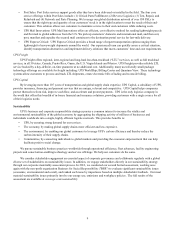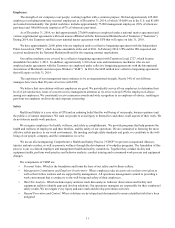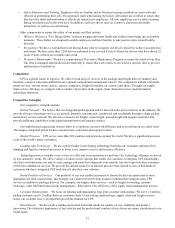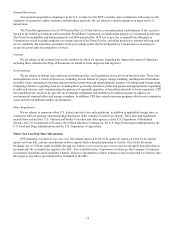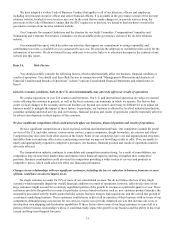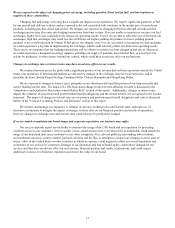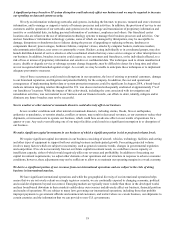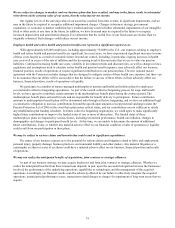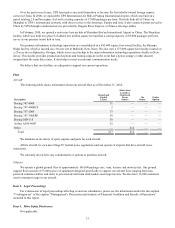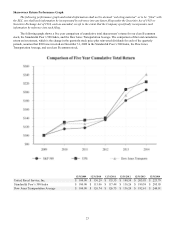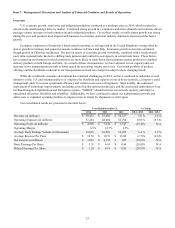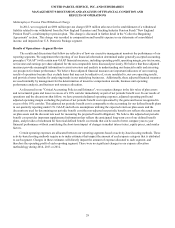UPS 2014 Annual Report Download - page 30
Download and view the complete annual report
Please find page 30 of the 2014 UPS annual report below. You can navigate through the pages in the report by either clicking on the pages listed below, or by using the keyword search tool below to find specific information within the annual report.18
A significant privacy breach or IT system disruption could adversely affect our business and we may be required to increase
our spending on data and system security.
We rely on information technology networks and systems, including the Internet, to process, transmit and store electronic
information, and to manage or support a variety of business processes and activities. In addition, the provision of service to our
customers and the operation of our networks and systems involve the storage and transmission of proprietary information and
sensitive or confidential data, including personal information of customers, employees and others. Our franchised center
locations also are reliant on the use of information technology systems to manage their business processes and activities. Our
and our franchisees’ information technology systems, some of which are managed by third-parties, may be susceptible to
damage, disruptions or shutdowns due to failures during the process of upgrading or replacing software, databases or
components thereof, power outages, hardware failures, computer viruses, attacks by computer hackers, malicious insiders,
telecommunication failures, user errors or catastrophic events. Hackers, acting individually or in coordinated groups, may also
launch distributed denial of service attacks or other coordinated attacks that may cause service outages or other interruptions in
our business. In addition, breaches in security could expose us, our customers and franchisees, or the individuals affected, to a
risk of loss or misuse of proprietary information and sensitive or confidential data. The techniques used to obtain unauthorized
access, disable or degrade service or sabotage systems change frequently, may be difficult to detect for a long time and often
are not recognized until launched against a target. As a result, we may be unable to anticipate these techniques or to implement
adequate preventative measures.
Any of these occurrences could result in disruptions in our operations, the loss of existing or potential customers, damage
to our brand and reputation, and litigation and potential liability for the company. In addition, the cost and operational
consequences of implementing further data or system protection measures could be significant. In August 2014, a broad-based
malware intrusion targeting retailers throughout the U.S. was discovered and subsequently eradicated at approximately 1% of
our franchisees’ locations. While the impact of this cyber-attack, including the costs associated with investigation and
remediation activities, was not material to our business and our financial results, our efforts to deter, identify, mitigate and/or
eliminate any future breaches may not be successful.
Severe weather or other natural or manmade disasters could adversely affect our business.
Severe weather conditions and other natural or manmade disasters, including storms, floods, fires or earthquakes,
epidemics or pandemics, or terrorist attacks, conflicts or unrest, may result in decreased revenues, as our customers reduce their
shipments, or increased costs to operate our business, which could have an adverse effect on our results of operations for a
quarter or year. Any such event affecting one of our major facilities could result in a significant interruption in or disruption of
our business.
We make significant capital investments in our business of which a significant portion is tied to projected volume levels.
We require significant capital investments in our business consisting of aircraft, vehicles, technology, facilities and sorting
and other types of equipment to support both our existing business and anticipated growth. Forecasting projected volume
involves many factors which are subject to uncertainty, such as general economic trends, changes in governmental regulation
and competition. If we do not accurately forecast our future capital investment needs, we could have excess capacity or
insufficient capacity, either of which would negatively affect our revenues and profitability. In addition to forecasting our
capital investment requirements, we adjust other elements of our operations and cost structure in response to adverse economic
conditions; however, these adjustments may not be sufficient to allow us to maintain our operating margins in a weak economy.
We derive a significant portion of our revenues from our international operations and are subject to the risks of doing
business in international markets.
We have significant international operations and while the geographical diversity of our international operations helps
ensure that we are not overly reliant on a single region or country, we are continually exposed to changing economic, political
and social developments beyond our control. Emerging markets are typically more volatile than those in the developed world,
and any broad-based downturn in these markets could reduce our revenues and adversely affect our business, financial position
and results of operations. We are subject to many laws governing our international operations, including those that prohibit
improper payments to government officials and commercial customers, and restrict where we can do business, our shipments to
certain countries and the information that we can provide to non-U.S. governments.



